
Advances in Applied Clifford Algebras
Scope & Guideline
Transforming Mathematical Concepts into Real-World Solutions
Introduction
Aims and Scopes
- Theoretical Developments in Clifford Algebras:
The journal publishes research on the foundational aspects of Clifford algebras, including their properties, representations, and relationships with other algebraic structures. - Applications in Physics:
A significant focus is on the application of Clifford algebras in theoretical physics, particularly in areas such as quantum mechanics, relativity, and gauge theories. - Geometric Algebra and Analysis:
Research that employs geometric algebra to solve problems in geometry, analysis, and applied mathematics is a core area of publication. - Machine Learning and Computational Methods:
The journal encourages studies that utilize Clifford algebras in machine learning and computational algorithms, reflecting the growing intersection of algebra and data science. - Hypercomplex Structures and Extensions:
Papers exploring hypercomplex numbers, including quaternions and octonions, and their applications in various mathematical frameworks are prominently featured.
Trending and Emerging
- Machine Learning and Artificial Intelligence:
Recent papers highlight the use of Clifford algebras in machine learning, particularly in developing algorithms that leverage their structures for improved data analysis and neural network designs. - Advanced Geometric Analysis:
There is a growing interest in applying geometric algebra to advanced topics in analysis, including integral equations and boundary value problems, which indicates a trend towards more complex mathematical modeling. - Quantum Computing and Quantum Information:
The journal features an increasing number of papers that intersect with quantum computing, focusing on the role of Clifford algebras in quantum algorithms and information theory. - Higher Dimensional and Non-commutative Algebra:
Emerging research on higher-dimensional algebras, including octonions and other non-commutative structures, is gaining traction, reflecting a broader interest in exploring complex mathematical frameworks. - Interdisciplinary Applications:
There is a notable trend towards interdisciplinary research that applies Clifford algebras to various fields, including engineering, computer graphics, and theoretical physics, indicating a shift towards practical applications.
Declining or Waning
- Classical Applications of Clifford Algebras:
There appears to be a decreasing emphasis on classical applications of Clifford algebras, such as traditional geometric interpretations and basic algebraic properties, as researchers shift towards more advanced and interdisciplinary applications. - Basic Quaternionic Analysis:
The exploration of fundamental quaternionic analysis has become less prominent, possibly overshadowed by more complex hypercomplex structures and their applications in modern physics and machine learning. - Historical Perspectives and Foundational Studies:
Papers focused on historical and foundational studies of Clifford algebras and their early applications are less frequently published, indicating a shift towards innovative and contemporary research themes.
Similar Journals

Filomat
Exploring Complex Concepts for Academic ExcellenceFilomat is a distinguished academic journal published by the University of Niš, Faculty of Science and Mathematics, located in Serbia. Operating since 2010, the journal has carved a niche within the field of mathematics, particularly in miscellaneous mathematics, as evidenced by its recognition in the Q3 quartile for 2023. With an ISSN of 0354-5180, Filomat provides a platform for both researchers and academics to share insights and advancements across diverse mathematical disciplines, enhancing collaboration and knowledge sharing. Although the journal currently does not offer open access, its contributions are critical for those engaging with complex mathematical concepts and applications. Furthermore, with a Scopus rank of #223 out of 399 in the realm of General Mathematics, it stands as a credible source for high-quality research. The journal's objective is to promote a deeper understanding and application of mathematical theories, making it a vital resource for students, professionals, and researchers alike.

REVIEWS IN MATHEMATICAL PHYSICS
Exploring the Frontiers of Mathematical PhysicsREVIEWS IN MATHEMATICAL PHYSICS is a premier scholarly journal published by WORLD SCIENTIFIC PUBL CO PTE LTD, focusing on the versatile and dynamic field of mathematical physics. Established in 1996, this journal has quickly become a pivotal resource for researchers and professionals seeking in-depth analyses and reviews of contemporary advancements in both mathematical and statistical physics. With an impressive categorization in Q2 for both Mathematical Physics and Statistical and Nonlinear Physics as of 2023, it ranks among the top in its field, boasting a Scopus Rank of #27 in Mathematical Physics and #29 in Statistical and Nonlinear Physics. While currently not available as an open-access platform, the journal remains valuable for its rigorous peer-reviewed articles that aim to bridge the gap between theoretical aspects and practical applications in physics. Given its significant influence—evidenced by a robust footprint in the academic community—REVIEWS IN MATHEMATICAL PHYSICS is essential reading for anyone dedicated to advancing their knowledge and understanding of complex physical phenomena.

Acta Mathematica Universitatis Comenianae
Promoting quality research across the spectrum of mathematics.Acta Mathematica Universitatis Comenianae is a distinguished journal dedicated to advancing the field of mathematics, particularly in its miscellaneous branches. Published by Comenius University in Slovakia, this journal provides a vital platform for researchers and scholars to disseminate their findings and engage with contemporary mathematical discourse. Despite being categorized in the fourth quartile for 2023 in general mathematics within Scopus, the journal plays an essential role in fostering academic dialogue and contributing to regional developments in mathematical research. The journal's scope includes a wide array of topics, ensuring contributions from various domains of mathematics are encouraged. With its commitment to publishing quality research, Acta Mathematica Universitatis Comenianae is an invaluable resource for professionals, students, and academics seeking to expand their knowledge and engage with a community of its peers.
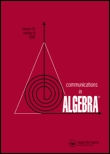
COMMUNICATIONS IN ALGEBRA
Empowering Research in Algebra and Number Theory.COMMUNICATIONS IN ALGEBRA is a prestigious academic journal dedicated to advancing the field of algebra and number theory. Published by Taylor & Francis Inc, this influential journal has been in circulation since its inception in 1974 and continues to provide a platform for innovative research through 2024. With an ISSN of 0092-7872 and an E-ISSN of 1532-4125, it serves a global community of researchers, professionals, and students who are passionate about algebraic studies. The journal is currently ranked in the Q2 category in Algebra and Number Theory for 2023, showcasing its strong impact and relevance within the academic community, as reflected in its Scopus rank of #60 out of 119 and a 50th percentile standing. COMMUNICATIONS IN ALGEBRA aims to publish high-quality, peer-reviewed research articles that not only address current issues in the field but also pave the way for future exploration, solidifying its role as a cornerstone of mathematical literature.
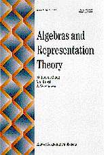
ALGEBRAS AND REPRESENTATION THEORY
Elevating Scholarship in Algebra and Representation TheoryALGEBRAS AND REPRESENTATION THEORY, published by SPRINGER, is a premier journal that focuses on the cutting-edge developments in the field of algebra and representation theory. With an ISSN of 1386-923X and an E-ISSN of 1572-9079, this journal has fostered a robust platform for both established and emerging researchers since its inception in 1998. As a Q1 journal in the Mathematics miscellaneous category for 2023, it stands out for its rigorous peer-review process and commitment to academic excellence. Although it is not an open-access journal, its broad scope includes significant theoretical advancements and applications that resonate across various mathematical disciplines. Located at VAN GODEWIJCKSTRAAT 30, 3311 GZ DORDRECHT, NETHERLANDS, ALGEBRAS AND REPRESENTATION THEORY continues to contribute meaningfully to the scientific community by providing researchers with essential insights and fostering collaboration in the increasingly complex landscape of mathematics. Researchers, professionals, and students are encouraged to engage with the latest publications, as the journal plays a critical role in shaping contemporary discussions and innovations in the study of algebraic structures.
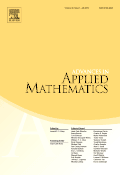
ADVANCES IN APPLIED MATHEMATICS
Pioneering Research for Practical Mathematical ApplicationsADVANCES IN APPLIED MATHEMATICS, published by ACADEMIC PRESS INC ELSEVIER SCIENCE, is a prestigious journal that has served the mathematical community since 1980. With its ISSN 0196-8858 and E-ISSN 1090-2074, the journal is based in the United States, specifically in San Diego, CA. As a leading periodical in the field, it holds a notable Q2 ranking in Applied Mathematics and has been consistently ranked in the 43rd percentile among similar journals, illustrating its relevance and impact within the discipline. Although not an Open Access journal, ADVANCES IN APPLIED MATHEMATICS plays a crucial role in disseminating significant research findings, theoretical studies, and innovative applications of mathematics that address real-world problems. Researchers, professionals, and students alike will find valuable insights in its carefully curated publications, making it an essential resource for those looking to advance their understanding and application of mathematics.

Symmetry-Basel
Cultivating a global dialogue in the realms of science and mathematics.Symmetry-Basel is an esteemed open-access journal published by MDPI, dedicated to advancing research in the interdisciplinary realms of Chemistry, Computer Science, Mathematics, and Physics. Launched in 2009, this robust platform facilitates the dissemination of cutting-edge studies and innovations, providing unrestricted access to a vast audience of researchers, professionals, and students alike. With an impressive convergence period extending from 2009 to 2024, Symmetry-Basel has rapidly garnered recognition, achieving a Q2 quartile ranking across multiple categories in 2023 and notable Scopus rankings that underscore its academic influence, including a commendable 94th percentile in General Mathematics. Situated in Basel, Switzerland, the journal not only promotes high-quality research but also fosters collaboration and dialogue among various scientific disciplines, thereby enhancing the interconnectedness of these dynamic fields.
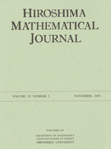
Hiroshima Mathematical Journal
Unveiling the Beauty of Numbers and GeometryThe Hiroshima Mathematical Journal, published by Hiroshima University, Graduate School of Science, serves as a prominent platform for disseminating high-quality research in the field of mathematics. Established in 1959, the journal has been an integral part of the mathematical community, focusing on areas such as Algebra, Number Theory, Analysis, and Geometry and Topology. Although currently classified in Q4 quartile rankings within its categories, the journal is committed to advancing mathematical knowledge and fostering scholarly dialogue. Its accessibility, combined with its long-standing history, makes it an essential resource for researchers, professionals, and students dedicated to exploring and enhancing the mathematical sciences. For those interested in contributing or accessing cutting-edge research, the Hiroshima Mathematical Journal continues to uphold its mission of excellence in mathematical scholarship.
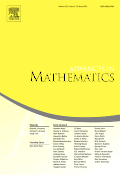
ADVANCES IN MATHEMATICS
Exploring New Frontiers in MathematicsADVANCES IN MATHEMATICS, published by Academic Press Inc. Elsevier Science, is a premier journal in the field of mathematics, with its ISSN 0001-8708 and E-ISSN 1090-2082. Renowned for its rigorous peer-reviewed research, this journal serves as a platform for disseminating cutting-edge advancements and innovative approaches across all branches of mathematics. With an impressive Q1 category ranking in Mathematics (miscellaneous) and a Scopus rank of 74/399 placing it in the 81st percentile, it is considered a vital resource for researchers and professionals seeking to stay abreast of emerging trends and developments. Although it is not currently an open access publication, ADVANCES IN MATHEMATICS remains committed to publishing high-quality articles that elevate the field and foster scholarly communication. Established in 1961 and continuously influential in advancing mathematical sciences, this journal is crucial for anyone deeply engaged in mathematical research.

Frontiers of Mathematics
Fostering Collaboration Across Mathematical DisciplinesFrontiers of Mathematics, published by SPRINGER HEIDELBERG, is an emerging academic journal dedicated to fostering the advancement of mathematical sciences from 2023 to 2024. With an ISSN of 2731-8648 and E-ISSN of 2731-8656, this journal is positioned in the category of Q2 in the miscellaneous mathematics domain, showcasing its commitment to quality research and innovation. Although in its nascent stages, it has swiftly established a foothold within the global academic landscape, holding a Scopus rank of #198/399 and a median percentile of 50, indicating a promising trajectory. By providing an open-access option, Frontiers of Mathematics ensures broad dissemination of research findings, fostering collaboration and knowledge sharing across the mathematical community. Researchers, professionals, and students alike will find this journal to be an invaluable resource, contributing to important discussions and advancements in various mathematical fields.